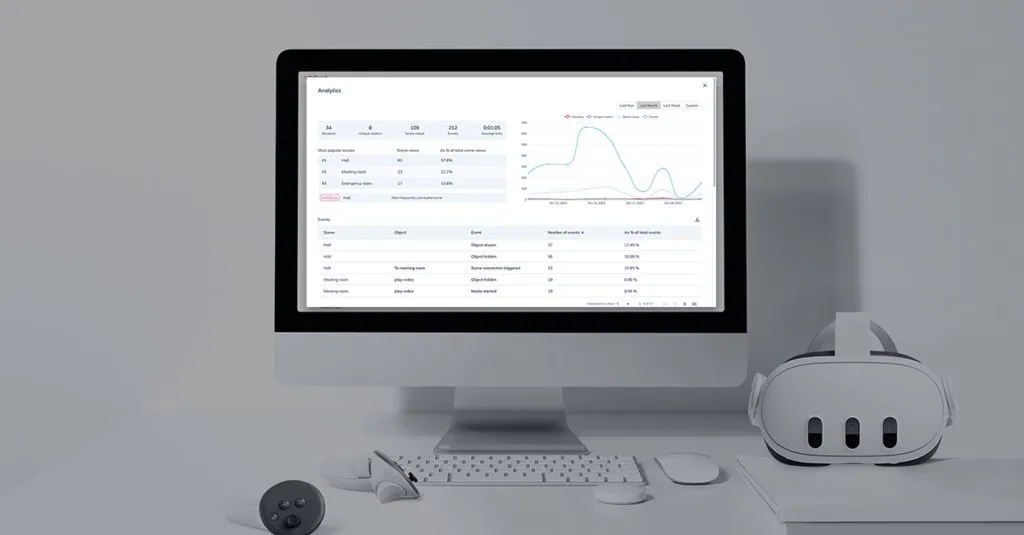Users now can enjoy more insights for corporate metaverse projects
Munich, 20.11.2023 – Munich-based virtual reality company VRdirect (www.vrdirect.com) is introducing a new analytics function in its “VRdirect Studio” software, primarily targeting business customers. As a result, project creators can now access user data and important key performance indicators (KPI’s) for their Virtual Reality projects directly within VRdirect Studio.
Leverage user behavior to tailor your VR projects even better
These new insights provide the foundation to track user behavior and better tailor virtual reality experiences to needs of users. This also marks a first step towards integrating with Learning-Management-Systems (LMS) as well as data-based machine learning, enabling an even more efficient approach to creating virtual reality projects.
The new VRdirect analytics function will offer data on the following insights, among others:
- Sessions and unique visitors: For entire projects as well as for individual scenes of a project
- Dwell time: Average usage time per project and scene
- Events: Number of events have occurred, e.g. interaction events (clicks/hovers on objects), scene changes or time events
- Exit Point: Point at which the project ended most often
- Device: Device types used an if viewed in browser or app
- Geography: Breakdown of visitors by geographic characteristics
To use the analytics function, project owners only need to be logged in and have created the project to be analyzed. And all data touchpoints can be processed and integrated in common data visualization tools or Learning Management Systems (LMS) for example via SCORM export.
“With the additional insights from analytics, we enable our customers to quantify user behavior in Virtual Reality projects and thus improve the business relevance of Virtual Reality experiences within their companies,” comments Dr. Rolf Illenberger, CEO of VRdirect, regarding the new function.
Corporate metaverse projects are already here
These insights can then for example be used to improve a fire alert training by analyzing user movement data within this virtual scenario, it’s possible to identify common areas where participants hesitate or take incorrect actions. This data can inform iterative redesigns of the training, emphasizing those challenging areas or introducing new scenarios that address observed weaknesses, ensuring participants are better prepared for real-life emergencies.
Another great example on how to leverage this information is improving virtual showrooms: Analytics data can reveal which products or displays in a virtual showroom garner the most attention and engagement from visitors. By understanding dwell times, interaction patterns, and user paths, designers can optimize the layout, highlight popular items more prominently, or introduce interactive features that address common questions or interests, enhancing the overall user experience and increasing potential sales conversions.
New analytics functionality is now available to all VRdirect Studio users. Those interested can learn more about the software at www.vrdirect.com or purchase a license directly from the Microsoft AppSource Store.
Analytics is not platform-side tracking of user data, but a product feature for our customers. No data is being collected by VRdirect, but only displayed for our customers in the VRdirect Studio individually per project.
About VRdirect
The Munich based-tech company VRdirect (www.vrdirect.com) is an enterprise-grade, no-code Virtual Reality platform that helps large companies like Siemens, Nestle, and Porsche easily create, manage, and share immersive VR content for internal training and communications as well as external sales, marketing, and customer support use cases.
VRdirect’s platform facilitates seamless VR content sharing and consumption across environments and devices and hence mitigates the challenges for enterprises who want to take advantage of the Metaverse but are faced with a fragmented and incompatible hardware and ecosystem market.
VRdirect enables enterprises to create VR projects without prior skills or training (think “Powerpoint for VR”) and share VR projects across a wide range of ecosystems ranging from web-browser to iOS and Android smartphones and tablets as well as VR headsets from Oculus/Meta, Pico and HTC.
VRdirect supports enterprise customers along the entire process of developing and implementing global-scale VR strategies and roll-out.
For further information, please contact:
Carsten Lackner
Managing Director
carsten.lackner@www.vrdirect.com
www.vrdirect.com



